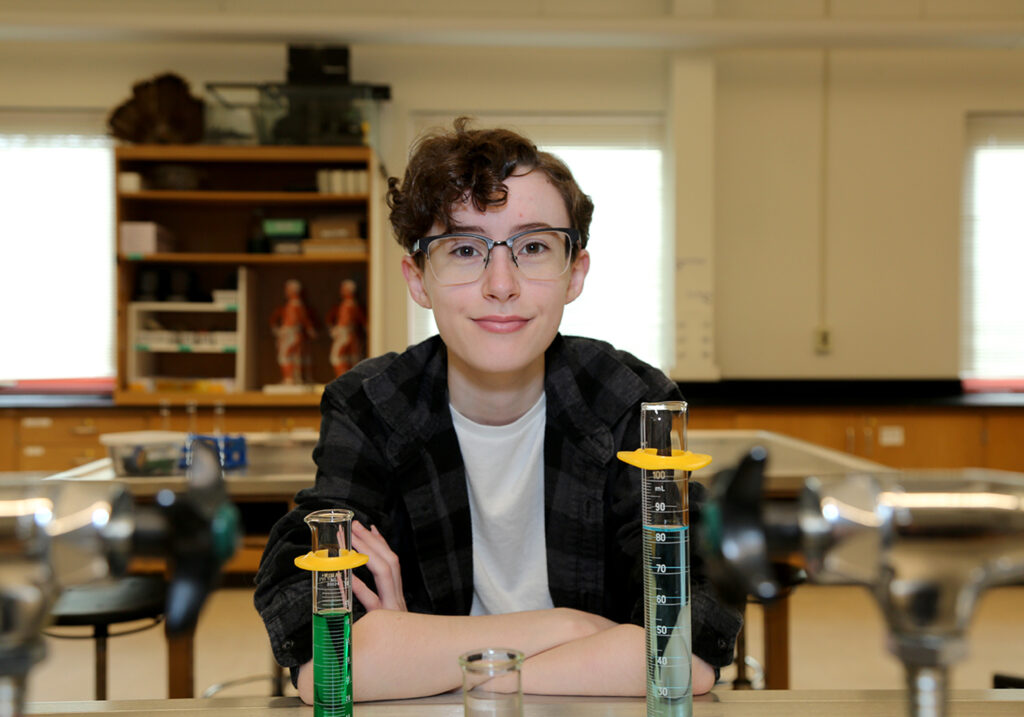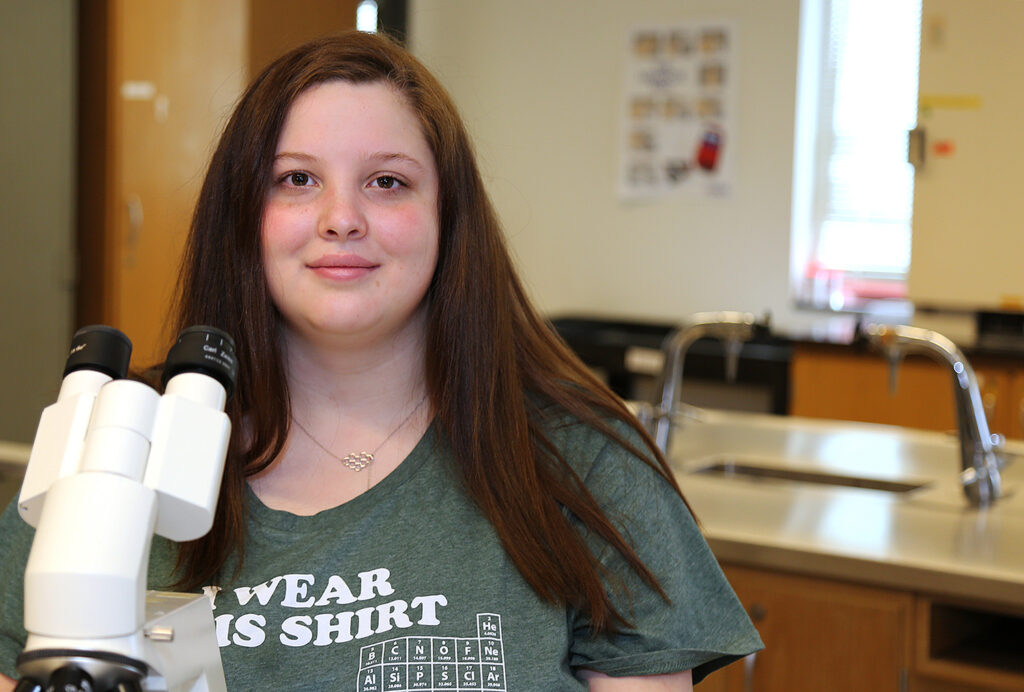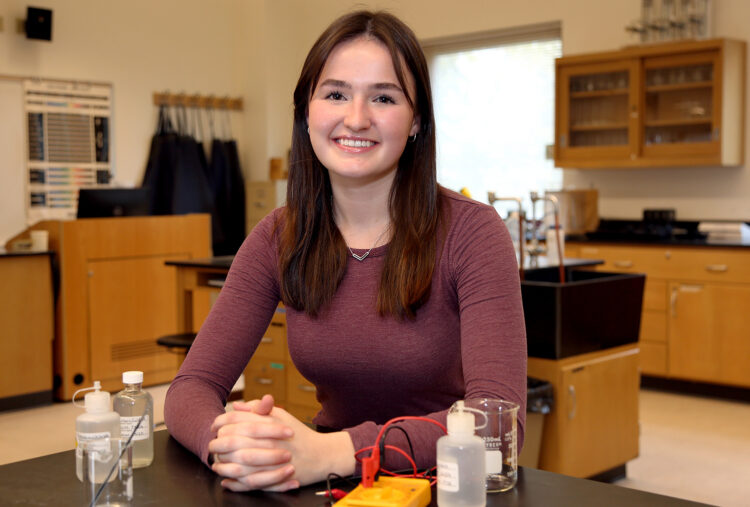(Butler, PA) For the third time in three years, a Butler County Community College student has been selected from national candidates to attend a residential summer research experience funded by the National Science Foundation.
Jeannine Eichenlaub, a 19-year-old engineering student from Saxonburg, is one of 10 first-year community college students chosen from 45 applicants for a research experience for undergraduates at the University of Massachusetts at Dartmouth.
The 2022 graduate of Knoch High School will study damage-sensing in liquid-metal-reinforced laminated composites through Aug. 11.
Hers is a topic among eight that students are exploring in a program called advanced interdisciplinary materials research for maritime applications.
“BC3 helped me to gain the qualifications to go to this,” Eichenlaub said. “All my chem classes, my math. Physics. All of them have been beneficial for this.”
Eichenlaub follows Ash Eury in 2022 and Hope Miller in 2021 as students in BC3’s science, technology, engineering and mathematics division to be picked for a National Science Foundation-funded residential summer research experience.
“This is an intensive research program for 40 hours a week. … She will have a wide range of experiences.”
Dr. Vijay Chalivendra, professor of mechanical engineering, University of Massachusetts at Dartmouth
Eury was one of 11 first-year community college students and Miller one of 10 selected for programs at James Madison University in Harrisonburg, Va.
Eury is a Seneca Valley High graduate from Cranberry Township who researched stress reactions of red-sided garter snakes. Miller, a Butler High graduate from Butler, studied visual neuroscience.
Eury and Miller graduated from BC3 with associate degrees in biological science and summa cum laude, a distinction for students with a final grade-point average of 3.75 or higher.
“This is a direct comment and compliment on the quality of our student population.”
Matt Kovac, dean of BC3’s science, technology, engineering and mathematics division

“A very dedicated faculty”
Engineering and biological science are among 15 associate degree programs in BC3’s STEM division.
“This is a direct comment and compliment on the quality of our student population,” said Matt Kovac, BC3’s dean of STEM.
“You have to have high-quality students who are able to be considered for these highly competitive opportunities. Alongside that, we have a very dedicated faculty who will not only provide high-quality instruction, but beyond that, are willing to work with students.”
Eichenlaub will attend a research ethics workshop, visit the Woods Hole Oceanographic Institution to be introduced to unmanned vehicles and to technology that creates 3-D mapping, learn how to use an oscilloscope, and how to analyze data and make observations from results.
“This is an intensive research program for 40 hours a week,” said Dr. Vijay Chalivendra, a professor of mechanical engineering and director of graduate studies for the College of Engineering at the University of Massachusetts at Dartmouth.
“These are all new things for her. She will have a wide range of experiences.”
Student researchers at the University of Massachusetts at Dartmouth will receive free housing, a meal allowance and a $6,000 stipend.
Eichenlaub built houses from Legos and assembled model airplanes as a child. She followed her two siblings to BC3, where she has attained the dean’s list, an honor for those with a grade-point average of between 3.5 and 3.74.
She plans to graduate debt-free in May 2024 and intends to become a mechanical engineer.
“This is an opportunity that is going to benefit me the rest of my life.”
Jeannine Eichenlaub, BC3 engineering student
Composites are used in many industries that include aerospace, automobile manufacturing and ship-building, Chalivendra said.
“We need to know if those composites are able to function as they are designed for and we can monitor the damage inside the structures to see whether they are safe to use,” he said.
Eichenlaub has stacked, vacuum-sealed and infused layers of woven carbon and glass fibers with resin and liquid metal.
After the resin has cured, she has sliced and placed the layers into a helium gas gun for ballistics tests and experimented with different orientations of the fabric or different percentages of liquid metal to find if the layer’s strength will increase.
“I think it’s really, really cool,” Eichenlaub said. “It’s just very different. I did not know stuff like this existed. There are weekly seminars where the 10 students in the program present what we’ve done during the week and what our results are. So I get to see what the other students are doing, which is fascinating.
“This is an opportunity that is going to benefit me the rest of my life.”

“A very important experience”
Eury this fall will transfer to Indiana University of Pennsylvania and pursue a bachelor’s degree in biology. Eury’s goal is to work in bird conservation.
“This (experience) gave me a first-person view of how all biological research is conducted,” Eury said. “I learned how to go deeper into the scientific method.”
Miller transferred to Slippery Rock University of Pennsylvania and is seeking a bachelor’s degree in biology with a minor in chemistry. Miller’s goal is to become a physician.
“It was a very important experience,” Miller said of her research at James Madison University. “It’s also important for medical school applications because it is a really competitive thing to have on your resume.”
First-year community college students were also chosen from Montgomery County Community College, Blue Bell, Pa.; Rogue Community College, Grants Pass, Ore.; Wake Technical Community College, Raleigh, N.C.; Bunker Hill Community College, Boston; Massachusetts Bay Community College, Framingham; Nashua Community College, Nashua, N.H.; and Central Arizona College, Coolidge.
Among topics being studied by other student researchers are bifunctional composite materials for structural energy storage in marine systems, simulation and modeling of bio-inspired active materials for nonaqueous redox flow batteries, and developing porous super-hydrophobic surfaces for saving fuels in maritime transportation.
Congress created the National Science Foundation in 1950 as an independent federal agency to, among other objectives, promote the progress of science.
The National Science Foundation states that it funds approximately 25 percent of all federally supported basic research conducted by colleges and universities in the United States.
Application materials for first-year community college students seeking a National Science Foundation-funded residential summer research experience included a resume, transcript of all post-secondary institutions, a statement of research interest and two letters of recommendations, including one from a faculty member.





